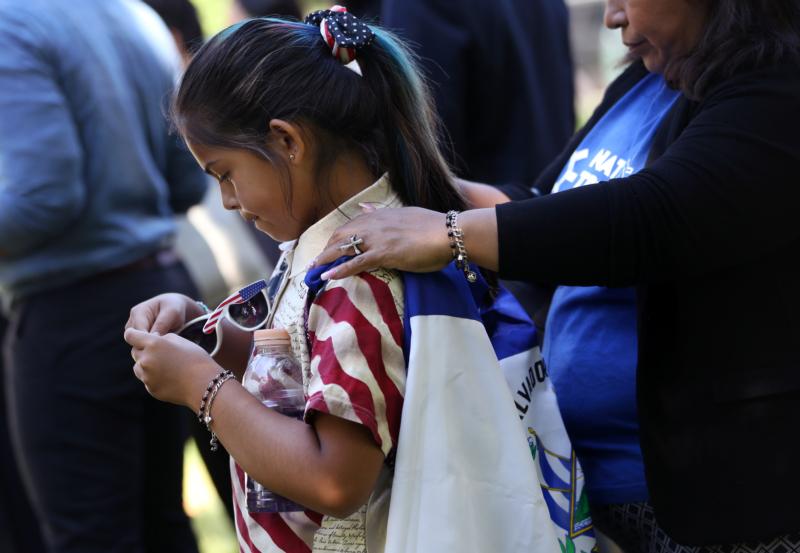
Marilyn Miranda, 9, draped in a Salvadoran flag, attends an immigration rally with her mother outside the U.S. Capitol in Washington June 4, 2019. On Sept. 14, a federal court sided with President Donald Trump in ending Temporary Protected Status (TPS) for immigrants from El Salvador, with those from five other nations likely to be affected as well. (CNS photo/Leah Millis, Reuters)
WASHINGTON (CNS) — The U.S. Court of Appeals for the 9th Circuit sided Sept. 14 with President Donald Trump’s plan to end a particular immigration protection status that would have allowed people from six countries that have suffered disasters to remain in the United States.
The court said the president was within his rights to revoke what’s called Temporary Protected Status, popularly known as TPS, from Salvadoran immigrants. TPS grants a work permit and a reprieve from deportation to certain people whose countries have experienced natural disasters, armed conflicts or exceptional situations, to remain temporarily in the United States.
The ruling also is expected to affect TPS holders from Haiti, Honduras, Nicaragua, Sudan and Nepal.
“He’s ended it but what it means is that there’s this six-month wind-down period,” said Ashley Feasley, director of policy for the U.S. Conference of Catholic Bishops’ Migration and Refugee Services. “It doesn’t affect people’s status this year. They still would be allowed to stay here and get a driver’s license and work authorizations they have now.”
[hotblock]
But that could stop early next year.
The wind-down period for the estimated 300,000 TPS holders is different for different countries but all is expected to take place in 2021 if the plans goes forward. But that timing brings some to speculate that the U.S. presidential election and its result could affect what ultimately happens.
The situation is complex, said Feasley. There’s also the issue of TPS holders who have families, including U.S.-born children, other pending legislation, possible involvement by the Supreme Court and there’s also a possibility, though not likely, Congress could act to provide a path to citizenship for TPS recipients.
Catholic organizations in the U.S. wasted no time in voicing opposition to the ruling.
“Congress created Temporary Protected Status more than 30 years ago, rightly, because it would be unconscionable to deport people back to crisis and conflict,” said Anna Gallagher, executive director of Catholic Legal Immigration Network Inc., known as CLINIC. “No family should be faced with the choice of either splitting up or moving their entire family, including U.S. citizen children, to a country where they face danger.”
Sister Marie Lucey, a Sister of St. Francis of Philadelphia, who is associate director of Franciscan Action Network, called the ruling “unconscionable” and said the decision was a “tragedy” for those with TPS and “a betrayal of all that is good in this country.”
PREVIOUS: Colombian church leaders call for reconciliation, truth following protests
NEXT: Bucks County parish teams up with archdiocese to reopen ministry



Share this story